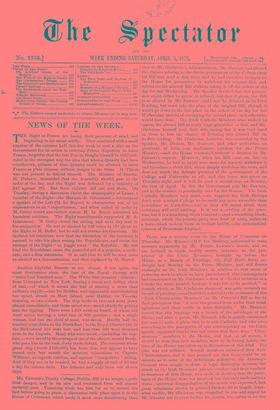Mr. Fawcett's Trinity College, Dublin, Bill is no longer a
poli- tical danger, and in its new and truncated form will almost certainly pass. Yesterday week, too late for Us to record the fact before going to press, a discussion took place upon it in the House of Commons, which made it seem more threatening than ever to Mr. Gladstone's Administration. Mr. Fawcett had altered the clauses relating to the future government of the College since his Bill was read a first time, and he had therefore to apply to the House for permission to withdraw his original Bill, and substitute the altered Bill without taking it off the orders of the day for last Wednesday. The Speaker decided that this permis- sion might either be given or refused, but that if given, the Bill as so altered by Mr. Faw-cett could not be debated on its First Reading, but must take the place of the original Bill, though it would go down to the last place on the orders of the day for last Wednesday, instead of occupying the second place, as it otherwise would have done. The Irish Catholic Members who wished to oppose the altered Bill at every stage grumbled at this, and Mr. Gladstone himself took their side, saying that it was very hard. on them to lose the chance of debating this altered Bill on its first reading. Mr. Gladstone, however, was overruled by the Speaker, Mr. Dodson, Mr. Bouverie, and other authorities on questions of form,—an unpleasant incident for the Prime Minister,—and the House consented without a division to Mr. Fawcett's request. However, when his Bill came on, late on Wednesday, lie had to apply once more for leave to withdraw it and introduce a third Bill, which simply abolishes the tests, and does not touch the delicate question of the government of the College and University at all ; and this leave was given on Thursday night, and it will be read a second time on Monday, the 21st of April. In this the Government join Mr. Fawcett, and so the combat is practically over for the Session. The Irish Catholic Members may resist,—we suppose the Irish Bishops don't wish a mixed College to be made any more accessible than heretofore to Catholics,—but as they will stand alone, their resistance will avail nothing. It is not a settling of the ques- tion, but it is a stumbling-block removed ;—and a stumbling-block, moreover, which the priestly party were fond of using rather as a horse-block to help them on to their hobby,—the ecclesiastical tyranny of Protestant England.


































